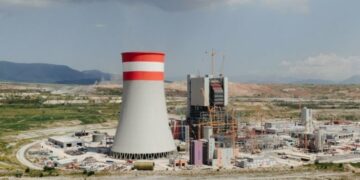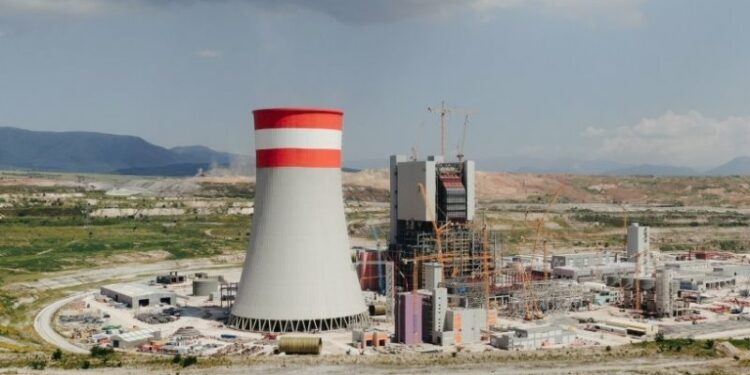Υπό τον φόβο πλήρους διακοπής της τροφοδοσίας με ρωσικό φυσικό αέριο, αλλά και λόγω της στενότητας ως προς τη διαθεσιμότητα LNG παγκοσμίως, οι τιμές του καυσίμου έχουν εκτοξευθεί σε δυσθεώρητα ύψη.
Την τρελή πορεία του TTF ακολουθούν οι τιμές ηλεκτρισμού. Στο ελληνικό Χρηματιστήριο Ενέργειας η τιμή για σήμερα 5/7 διαμορφώθηκε στα 323,78 ευρώ/MWh αυξημένη κατά 9% σε σχέση με χθες, ενώ η μέγιστη τιμή βρέθηκε στα 434 ευρώ/MWh η ελάχιστη στα 248 ευρώ/MWh. Η συμμετοχή του φυσικού αερίου στο ενεργειακό μείγμα είναι στο 38,3%, των ΑΠΕ 39%, του λιγνίτη στο 13%, των υδροηλεκτρικών στο 4,9% και 1,7% είναι οι εισαγωγές.
Οι ισχυρές εταιρίες έχουν ξεκινήσει μπαράζ παραγγελιών νέων φορτίων όπως οι ΔΕΠΑ και Mytilineos. O δεύτερος έχει κλείσει slots στην Ρεβυθούσα τόσο για το 2023 όσο και για το 2024
Πέραν της επιστράτευσης των διαθεσίμων λιγνιτικών, η Πτολεμαΐδα 5 ισχύος 660 MW αναμένεται να τεθεί σε δοκιμαστική λειτουργία το Φθινόπωρο. Αποτελεί την πιο σύγχρονη λιγνιτική μονάδα στην Ευρώπη με πολύ χαμηλό αποτύπωμα άνθρακα 1 τόνο CO2/MWh σε σχέση με 1,6 τόνο CO2/MWh μέση τιμή εκπομπών των υπόλοιπων υφιστάμενων μονάδων
Παραμένει ανταγωνιστική η ελληνική αγορά
Πολύ υψηλότερες σε σχέση με την Ελλάδα είναι οι τιμές στην υπόλοιπη Ευρώπη με την αγορά της Ιταλίας να φθάνει στα 418,68 ευρώ/MWh, της Βουλγαρίας και της Ρουμανίας στα 347,08 ευρώ/MWh, της Γαλλίας στα 371,6 ευρώ/MWh και της Γερμανίας στα 318,37 ευρώ/MWh.
Στην αύξηση των τιμών του φυσικού αερίου συμβάλλει μεταξύ άλλων η απεργία που έχουν κηρύξει οι εργαζόμενοι στους ενεργειακούς ομίλους της Νορβηγίας, η οποία και μπορεί να μειώσει κατά 13% τις νορβηγικές εξαγωγές αερίου την ερχόμενη εβδομάδα, προειδοποιούν αναλυτές, επισημαίνοντας ότι η απεργία γίνεται σε μία περίοδο που η Νορβηγία έχει αυξήσει την παραγωγή της και τις παραδόσεις προς την Ευρώπη, υποκαθιστώντας ένα μέρος της απώλειας από τις μειωμένες εισροές ρωσικού αερίου.
Οι εργαζόμενοι που διεκδικούν αύξηση μισθών λόγω της ακρίβειας έχουν δηλώσει ότι από σήμερα διακόπτονται οι εργασίες σε τρεις υπεράκτιες εξέδρες εξόρυξης, ενώ αύριο θα κλείσουν και άλλες τρεις αν δεν ευοδωθούν οι διαπραγματεύσεις.
Ας σημειωθεί δε, ότι ένα από τα μεγαλύτερα τερματικά εξαγωγής LNG των HΠΑ βρίσκεται εκτός λειτουργίας ως τον Οκτώβριο, εξ αιτίας ενός ατυχήματος και ως το τέλος του χρόνου αναμένεται ότι θα υπολειτουργεί.
Ήλθε το FSU της Ρεβυθούσας
Στην Ελλάδα ο υπουργός Περιβάλλοντος- Ενέργειας Κώστας Σκρέκας μετά την έκτακτη σύσκεψη που συγκάλεσε χθες στο υπουργείο για την επάρκεια, δήλωσε ότι η Ελλάδα έχει τη δυνατότητα να ανταπεξέλθει ικανοποιητικά στα σενάρια μείωσης της τροφοδοσίας από τη Ρωσία. Πρόσθεσε ότι η χώρα αντιμετωπίζει μικρότερους κινδύνους σε σχέση με άλλες χώρες της Ευρώπης, δεδομένης της διαθεσιμότητας φορτίων LNG. Μάλιστα κατέπλευσε ήδη στη Ρεβυθούσα, το πλοίο-αποθήκη υγροποιημένου φυσικού αερίου, το οποίο σε πλήρη ανάπτυξη αυξάνει την αποθηκευτική ικανότητα της Ρεβυθούσας κατά 145.000 κυβικά μέτρα.
Ο υπουργός δήλωσε ακόμα ότι η ΔΕΠΑ Εμπορίας όπως και οι άλλοι εισαγωγείς αερίου βρίσκονται σε συνεχή επικοινωνία με τους προμηθευτές τους για επιπλέον φορτία αν χρειαστεί. Καθώς όμως οι περισσότεροι ευρωπαίοι εισαγωγείς αυξάνουν συνεχώς τις παραγγελίες τους, το πρόβλημα γίνεται πιο πιεστικό για όλους, συμπεριλαμβανομένης και της χώρας μας, τόσο από πλευράς τιμών όσο και ποσοτήτων.
Σύμφωνα με τον κ. Σκρέκα σε περίπτωση ακραίας κρίσης, η Ελλάδα που βρίσκεται μεν σε καλύτερη θέση από άλλες χώρες της Ευρώπης, θα καλύψει κατά προτεραιότητα τις εγχώριες ανάγκες και εν συνεχεία θα δει το θέμα των εξαγωγών σε γειτονικές χώρες όπως η Βουλγαρία και η Ρουμανία
Έτοιμες οι λιγνιτικές – Για την αιχμή το diesel
Εν τω μεταξύ οι διαθέσιμες λιγνιτικές μονάδες της ΔΕΗ συνεχίζουν να λειτουργούν με τη σημερινή τους παραγωγική δυναμικότητα και δεν παρουσιάζουν ελλείψεις. Πληροφορίες αναφέρουν ότι αυτή τη στιγμή λειτουργούν τα ορυχεία του Νότιου Πεδίου και της Μαυροπηγής στη Δυτική Μακεδονία και αυτό της Μεγαλόπολης. Η αύξηση της παραγωγής στα ορυχεία της ΔΕΗ δεν έχει αποτυπωθεί ακόμη στο μίγμα ηλεκτροπαραγωγής,
Σε ετοιμότητα είναι και οι πέντε μονάδες ηλεκτροπαραγωγής που λειτουργούν τώρα με καύσιμο φυσικό αέριο και, σε περίπτωση που χρειαστεί, θα έχουν τη δυνατότητα εναλλαγής καυσίμου και λειτουργίας με diesel.
Όμως οι μονάδες αυτές έχουν δυνατότητα λειτουργίας μόνο για 240 ώρες το χρόνο η κάθεμια με diesel και ως εκ τούτου θα αξιοποιηθούν για την κάλυψη των αιχμών.
Τα αποθέματα νερού για τη λειτουργία των υδροηλεκτρικών μονάδων είναι ικανοποιητικά.
Εν τω μεταξύ στη Γερμανία, μετά το αίτημα της Uniper, του μεγαλύτερου εισαγωγέα αερίου της χώρας, για κρατική βοήθεια η κυβέρνηση εξετάζει σειρά νομοθετικών παρεμβάσεων, που θα της επιτρέπουν να διασώζει εταιρίες του ενεργειακού τομέα. Φαίνεται ότι αρκετοί προμηθευτές βρίσκονται στα πρόθυρα της κατάρρευσης, καθώς αντιμετωπίζουν αυξανόμενα κόστη τα οποία δεν μπορούν να μετακυλήσουν στους πελάτες.
Σύμφωνα με το Reuters, το γερμανικό δημόσιο μπορεί να αποκτήσει μετοχικό μερίδιο στη Uniper ως έσχατη λύση για τα κεφάλαια διάσωσης που θα χρειαστεί η εταιρία. Εξετάζεται μάλιστα αν θα μπορούσε να εφαρμοστεί το μοντέλο της Lufthansa, η οποία έλαβε έκτακτη κεφαλαιακή ενίσχυση 9 δισ. ευρώ από την κυβέρνηση κατά την περίοδο της πανδημίας με το γερμανικό δημόσιο να παίρνει το 20% των μετοχών της χωρίς δικαίωμα ψήφου.
Ένα άλλο μέτρο που εξετάζεται είναι να επιτραπεί στην κυβέρνηση να επιβάλει γρήγορα μια ειδική εισφορά στους καταναλωτές ως μέσο για τη δίκαιη μετακύλιση του αυξανόμενου ενεργειακού κόστους, ανέφεραν οι κυβερνητικές πηγές στο Reuters.
www.worldenergynews.gr




























